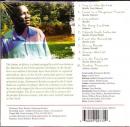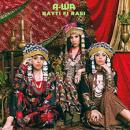اشلّ بنتي; وحشتي*
لغة امي; نسيج ابي
يا وطني المتواضع
يا وطني مضروب الشمس
اضحك معي لآخر كره
قبل ما انا اسافر
اشلّ كل اكالش; اشلّ الجوع
اشلّ قوة جسدي; قلبي المكسور
روحي الهايمه; اشل الكذب
صلاتي الصدق; اياسي المطلق
اشلّ بنتي; وحشتي
لغة امي; نسيج ابي
يا وطني المتواضع
يا وطني مضروب الشمس
اضحك معي لآخر كره
قبل ما انا اسافر
اشلّ كل اكالش; اشلّ الجوع
اشلّ قوة جسدي; قلبي المكسور
الشوكه في رجلي; اللحفه في راسي
اشلّ بيتي
لغة امي; نسيج ابي
يا وطني المتواضع
يا وطني مضروب الشمس
اضحك معي لآخر كره
قبل ما انا اسافر
اشلّ كل اكالش; اشلّ الجوع
اشلّ قوة جسدي; قلبي المكسور
روحي الهايمه; اشل الكذب
صلاتي الصدق; اياسي المطلق
اشلّ بنتي; وحشتي
لغة امي; نسيج ابي
يا وطني المتواضع
يا وطني مضروب الشمس
اضحك معي لآخر كره
قبل ما انا اسافر
اشلّ كل اكالش; اشلّ الجوع
اشلّ قوة جسدي; قلبي المكسور
الشوكه في رجلي; اللحفه في راسي
اشلّ بيتي
* asheel binti; wahshati
lughat ummi; nasij abi
ya watani almitwad'e
ya watani madrub alshams
adhak me'ee lakher karha
gabl ma ana asafer
asheel kul ukalish; asheel aljwu'
asheel guwat jismy; galbi al maksur
ruhi alhaymha; asheel alkadab
slaty alsudq; ayasy almutlag
ya watani almitwad'e
ya watani madrub alshams
asheel binti; wahshati
lughat ummi; nasij abi
ya watani almitwad'e
ya watani madrub alshams
adhak me'ee lakher karha
gabl ma ana asafer
asheel kul ukalish; asheel aljwu'
asheel guwat jismy; galbi al maksur
shawukha fi rejlee; allihfha fi rasi
asheel bayti
ya watani almitwad'e
ya watani madrub alshams
asheel binti; wahshati
lughat ummi; nasij abi
lughat ummi; nasij abi
ya watani almitwad'e
ya watani madrub alshams
adhak me'ee lakher karha
gabl ma ana asafer
asheel kul ukalish; asheel aljwu'
asheel guwat jismy; galbi al maksur
ruhi alhaymha; asheel alkadab
slaty alsudq; ayasy almutlag
ya watani almitwad'e
ya watani madrub alshams
asheel binti; wahshati
lughat ummi; nasij abi
ya watani almitwad'e
ya watani madrub alshams
adhak me'ee lakher karha
gabl ma ana asafer
asheel kul ukalish; asheel aljwu'
asheel guwat jismy; galbi al maksur
shawukha fi rejlee; allihfha fi rasi
asheel bayti
ya watani almitwad'e
ya watani madrub alshams
asheel binti; wahshati
lughat ummi; nasij abi
envoyé par Dq82 - 7/2/2020 - 15:18
Langue: anglais
English translation from the official site
MY HOMELAND
I will take my daughter; my loneliness
My mother’s language; my father’s weaving
My humble homeland
My sun-drenched homeland
Show me your smile for the last time,
Before I leave
I will take your dishes; I will take the hunger
The strength within me; my broken heart
My wandering soul; I will take the falsehood
My sincere prayers; my total despair
I will take my daughter; my loneliness
My mother’s language; my father’s weaving
My humble homeland
My sun-drenched homeland
Show me your smile for the last time,
Before I leave
I will take your dishes; I will take the hunger
The strength within me; my broken heart
The thorn in my heel; the scarf for my head
I will take my home
I will take my daughter; my loneliness
My mother’s language; my father’s weaving
My humble homeland
My sun-drenched homeland
Show me your smile for the last time,
Before I leave
I will take your dishes; I will take the hunger
The strength within me; my broken heart
My wandering soul; I will take the falsehood
My sincere prayers; my total despair
I will take my daughter; my loneliness
My mother’s language; my father’s weaving
My humble homeland
My sun-drenched homeland
Show me your smile for the last time,
Before I leave
I will take your dishes; I will take the hunger
The strength within me; my broken heart
The thorn in my heel; the scarf for my head
I will take my home
envoyé par Dq82 - 7/2/2020 - 15:20
Langue: hébreu
Hebrew translation from the official site
יַא-וַטַנִי (מוֹלַדְתִּי)
אֶקַּח אֶת בִּתִּי; אֶת בְּדִידוּתִי
אֶת שְׂפַת אִמִּי; אֶת רִקְמַת אָבִי
מוֹלַדְתִּי הַצְּנוּעָה,
מוֹלַדְתִּי מֻכַּת הַשֶּׁמֶשׁ
חַיְּכִי אֵלַי בַּפַּעַם הָאַחֲרוֹנָה,
לִפְנֵי שֶׁאֲנִי עוֹזֶבֶת
אֶקַּח אֶת תַּבְשִׁילַיִךְ; אֶקַּח אֶת הָרָעָב
אֶקַּח אֶת חֹסֶן גּוּפִי; אֶת לִבִּי הַשָּׁבוּר
אֶת רוּחִי הַנּוֹדֶדֶת; אֶקַּח אֶת הַכָּזָב
אֶת תְּפִלּוֹתַי הַכֵּנוֹת; אֶת יֵאוּשִׁי הַגָּמוּר
אֶקַּח אֶת בִּתִּי; אֶת בְּדִידוּתִי
אֶת שְׂפַת אִמִּי; אֶת רִקְמַת אָבִי
מוֹלַדְתִּי הַצְּנוּעָה,
מוֹלַדְתִּי מֻכַּת הַשֶּׁמֶשׁ
חַיְּכִי אֵלַי בַּפַּעַם הָאַחֲרוֹנָה,
לִפְנֵי שֶׁאֲנִי עוֹזֶבֶת
אֶקַּח אֶת תַּבְשִׁילַיִךְ; אֶקַּח אֶת הָרָעָב
אֶקַּח אֶת חֹסֶן גּוּפִי; אֶת לִבִּי הַשָּׁבוּר
אֶת הַקּוֹץ בְּכַף רַגְלִי, אֶת הַמִּטְפַּחַת לְרֹאשִׁי
אֶקַּח אֶת בֵּיתִי
אֶקַּח אֶת בִּתִּי; אֶת בְּדִידוּתִי
אֶת שְׂפַת אִמִּי; אֶת רִקְמַת אָבִי
מוֹלַדְתִּי הַצְּנוּעָה,
מוֹלַדְתִּי מֻכַּת הַשֶּׁמֶשׁ
חַיְּכִי אֵלַי בַּפַּעַם הָאַחֲרוֹנָה,
לִפְנֵי שֶׁאֲנִי עוֹזֶבֶת
אֶקַּח אֶת תַּבְשִׁילַיִךְ; אֶקַּח אֶת הָרָעָב
אֶקַּח אֶת חֹסֶן גּוּפִי; אֶת לִבִּי הַשָּׁבוּר
אֶת רוּחִי הַנּוֹדֶדֶת; אֶקַּח אֶת הַכָּזָב
אֶת תְּפִלּוֹתַי הַכֵּנוֹת; אֶת יֵאוּשִׁי הַגָּמוּר
אֶקַּח אֶת בִּתִּי; אֶת בְּדִידוּתִי
אֶת שְׂפַת אִמִּי; אֶת רִקְמַת אָבִי
מוֹלַדְתִּי הַצְּנוּעָה,
מוֹלַדְתִּי מֻכַּת הַשֶּׁמֶשׁ
חַיְּכִי אֵלַי בַּפַּעַם הָאַחֲרוֹנָה,
לִפְנֵי שֶׁאֲנִי עוֹזֶבֶת
אֶקַּח אֶת תַּבְשִׁילַיִךְ; אֶקַּח אֶת הָרָעָב
אֶקַּח אֶת חֹסֶן גּוּפִי; אֶת לִבִּי הַשָּׁבוּר
אֶת הַקּוֹץ בְּכַף רַגְלִי, אֶת הַמִּטְפַּחַת לְרֹאשִׁי
אֶקַּח אֶת בֵּיתִי
envoyé par Dq82 - 7/2/2020 - 15:24
×
![]()






Bayti Fi Rasi
Nota: i titoli sono anche sul disco traslitterati in caratteri latini
“Bayti Fi Rasi” (la mia casa è nella mia testa) è un concept album di musica originale ispirato alla storia della bisnonna delle tre sorelle, ebrea mizrahi immigrata in Israele dallo Yemen tra il ’49 e il ’50. Il disco tratta problematiche contemporanee di immigrazione, accoglienza ed integrazione, incarnate nell’archetipica antenata delle cantanti. Mizrahi è un termine a ombrello che si riferisce agli ebrei provenienti da nazioni a prevalenza musulmana. La storia dei Mizrahi in Israele è costellata di avversità, sintomo di una politica nazionalistica che osteggiava, in maniera non ufficiale, tutto ciò che ricordava il mondo Arabo. Il passato sociale dei mizrahi, infatti, assomiglia molto a quello dei Palestinesi del ’48, ovvero gli scampati all’esodo forzato che hanno ottenuto cittadinanza Israeliana. Limitato accesso alla vita politica e al lavoro, precarietà economica, e una relegazione de facto ai borghi più periferici delle città rendono i Mizrahi, in qualche modo, cittadini di serie B. L’importanza di questo disco e del successo della band si condensa nella creazione di un canale espressivo per una minoranza che può finalmente raccontare la propria storia e far sentire la sua voce. La popolarità e l’impatto di artisti come A-Wa, Dudu Tassa, Neta Elkayam e in passato Zohar Argov segue un processo di lenta integrazione. A connettere questi musicisti vi è anche la voglia di riscoprire ed esplorare le proprie origini musicali, incorporando elementi sonori rispettivamente dallo Yemen, dall’Iraq e dal Marocco. Il disco alterna beat tirati indietro a ritmiche ballerine, sintetizzatori bizzarri ad altri più comuni nel linguaggio pop mainstream. Il canto è spesso eterofonico, con una cantante solista a cui risponde il coro delle sorelle, con parti raramente armonizzate tra di loro. Questa caratteristica è tipica di molta musica medio-orientale e di molti rituali religiosi, dove la recitazione del corano si alterna ad un pattern melodico in risposta da parte dei fedeli. Il sound della band è unico, peculiare nella produzione, nella sintesi e nel canto. “Ya Watani”, “Mudbira” e “Hana Mash Hu Al Yaman” introducono l’album presentando tutte queste caratteristiche. Tematicamente, la prima presenta l’addio della bisnonna alla terra natia, seguita dalle motivazioni dell’esodo e infine le difficoltà trovate all’arrivo. “Hana Mash Hu Al Yaman” è forse la pepita più scintillante del disco, con forti riferimenti alla condizione degli immigrati in generale, e rimandi al simbolismo letterario locale. “Min Tiht Al Firash” e “Makhada Min Thahab” presentano una più marcata matrice medio-orientale. Il melisma delle melodie vocali, gli archi che rispondono alla voce tra un verso e l’altro e le percussioni rimandano agli anni d’oro della musica medio-orientale, con richiami, sebbene lontani e decontestualizzati, a Umm Kulthum e Fairuz. “Bayti Fi Rasi” è un prodotto contemporaneo su cui la tradizione e il tempo hanno lasciato cicatrici visibili ed importanti. La riuscita di un bilanciamento coraggioso tra tradizioni pericolosamente diverse è provata dal successo della band sia in Israele che tra un pubblico internazionale. In un panorama musicale dove artisti Mizrachi emergono sempre più vittoriosi nel proporre un’identità mista, culturale e musicale, il successo di A-Wa è causa ed effetto di una nuova integrazione culturale e musicale. La sperimentazione sonora della band e l’importanza delle tematiche finora trattate ci fanno sperare in un terzo album altrettanto interessante.
blogfoolk.com